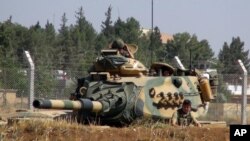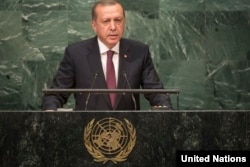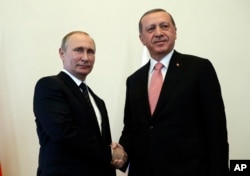More than five years of relentless war have fragmented Syria like a jigsaw puzzle. The task of reassembling the pieces increasingly seems to rest not with Western policymakers, Gulf princes or Iranian ayatollahs but with Russia and now Turkey, some diplomatic observers say.
Ankara’s Operation Euphrates Shield – a military intervention launched August 24, just weeks after a botched military coup against Turkish President Recep Tayyip Erdogan – potentially could be the biggest game changer in the Syrian conflict since Moscow’s military entered the fray a year ago.
Most analysts and rebel commanders credit Russia with saving the regime of its longtime ally, Syrian President Bashar al-Assad, from defeat by opposition groups in his country.
But Turkey, too, has emerged as a formidable force. Its operation aims at two foes: the Islamic State terror group and the Kurdish People’s Protection Units, or YPG, an offshoot of Turkish separatist insurgents. Already, it has brought major repercussions. Turkish troops have backed Free Syrian Army (FSA) militias in pushing the Islamic State terror group farther from the Syrian-Turkish border. They’ve also dashed the Syrian Kurds’ hope of linking all four of their cantons along the frontier, undermining the Kurdish ambition of carving out an independent state.
Expansion plans
And Erdogan’s play appears unfinished.
In Istanbul early this week, before traveling to the annual United Nations General Assembly in New York, he told reporters that he’s weighing expanding the 900 square kilometers of Syria currently under Turkish control to a 5,000-square-kilometer safe zone.
The plan, if successful, would see FSA rebels not just moving south to the strategic town of al-Bab, northeast of Aleppo, but also west “to the towns of Marea and Tell Rifaat,” a senior European diplomat told VOA, speaking on the condition of anonymity. Some observers think FSA troops are turning into clients more of the Turks than Western powers.
The YPG currently hold Tell Rifaat, which adjoins Afrin, a Kurdish enclave the YPG hoped to link with three cantons east of the Euphrates River.
General Valery Gerasimov, chief of the Russian Armed Forces’ general staff, last week visited Ankara and warned of political and military risks to any expansion of Operation Euphrates Shield, according to the Interfax news agency.
But the Russians generally "have been restrained in their objections," the unnamed diplomat told VOA. And Kremlin-controlled media outlets have been noticeably careful in criticizing Turkey’s military intervention.
"Turkey is intent on taking matters into its own hands in northern Syria," said Merve Tahiroglu, an analyst at the Foundation for the Defense of Democracies, a Washington-based think tank.
She said Moscow appears to have given tacit approval.
"Turkey, embittered by Washington’s close cooperation with the YPG over the last two years, will act increasingly independent from the U.S. in Syria," she predicted. "The picture is getting increasingly complicated, and much will depend on the new Moscow-Ankara hotline" to shape events in Syria.
The United States has backed the Turkish mission. But U.S. officials, who spoke on condition of anonymity, said Washington and Ankara have differing opinions on aspects of Operation Euphrates Shield.
Tighter Turkish-Russian ties
Melkulangara Bhadrakumarhe, a former Indian diplomat and one-time envoy to Turkey, contends the Turkish president estimates he "has the political space to maneuver" in the wake of the warming of relations between Moscow and Ankara.
During Erdogan’s visit to St. Petersburg in early August, Russian President Vladimir Putin referred to the Turkish leader as "dear friend," and the two agreed to restore economic ties damaged after Turkey shot down a trespassing Russian warplane in November 2015.
Yet there are differences over a role for Assad. While Moscow has backed Syria’s president, Ankara has wanted him gone. But Turkish may be signaling there is wiggle room.
Erdoğan has maintained his drumbeat that Assad must go. After addressing the U.N. General Assembly on Tuesday, he told Reuters news agency that "Assad cannot be part of any transitional period ... the world should find a solution that does not involve Assad."
Prime Minister Binali Yildirim spun Ankara’s position a little differently in a comment August 20, hedging that Ankara might accept a transitional role for Assad but no place in Syria's longer-term future.
"For good or ill, Turkey has become a major player in what happens in Syria now; it has strengthened its hand," said the European diplomat. "It now has a piece of real estate and a bargaining chip. Erdoğan shouldn’t be underestimated."
Ability to apply pressure
Maneuvering along the geopolitical fault line between the West and a newly assertive Moscow determined to challenge its influence on the world stage, Erdoğan can apply pressure on both camps, analysts say.
The European Union is desperate to have him uphold the bargain he struck earlier this year to curb the flow of migrants into Europe. The United States wants Turkey’s support in fighting the Islamic State. And Russia wants Turkey to at least be sympathetic to its position in competing with NATO for naval influence in the Black Sea.
As the buffer zone expands with FSA boots on the ground and Turkish air and artillery support, Ankara already is making clear how it intends to administer its northern Syria “protectorate.” Western NGOs have already been tipped off by Turkish counterparts that Turkish and Syrian NGOs favored by Erdoğan will be key in ruling the protectorate.
“If you trace who is behind them, like IHH, they all lead back to Islamists figures and are influenced by the Muslim Brotherhood,” said a Syrian NGO worker who asked to have his name withheld.
And Ankara is in the process of establishing pro-Turkish town councils. That courts risks for Turkey, says Bassam Al Kuwatli, a Syrian activist. “It is only a matter of time before resentment builds up. The Turks are powerful now but after a while people will want to have control over their own lives,” he adds.
And there are other risks too for Turkey in the dance between two of the World’s most mercurial leaders. The more Ankara directs anti-Assad rebels in northern Syria, the more Moscow will expect the Turks to be able to control the insurgents in any future peace or truce negotiations that may take place or even in day-to-day military operations. That could prove difficult, as Washington has found in the past.
Analyst Tahiroglu said she suspects the “Turkish military will be cautious not to come too close to regime territory.” But she added, “the FSA is unlikely to halt its southward advance.”






